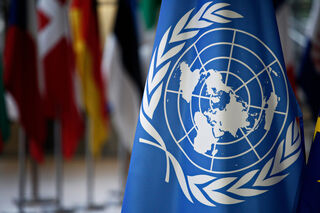Environment
A New Climate Change Report Without Much New Overall
The UN's climate change panel published its physical science assessment today.
Posted August 9, 2021 Reviewed by Devon Frye
Key points
- Humanity is changing the climate rapidly and substantively.
- This is already known, along with actions needed to deal with the impending problems.
- A continuing intergovernmental panel might not be the answer.
Today, a new report was released from the United Nations’ Intergovernmental Panel on Climate Change (IPCC). It states that humanity is changing the Earth’s climate rapidly and substantively leading to major, detrimental impacts which we must address.

This overall message is nothing new. We have known it for decades. Why did 234 authors from 66 countries require seven years since the last IPCC assessment to make this statement?
It goes back to the IPCC’s purpose as “the United Nations body for assessing the science related to climate change.” Whether the science is helpful or not, whether the assessment influences policy or not, the IPCC exists to do this work.
Which is, in my view, an awful answer. So what are we actually learning from the IPCC? Especially when their website crashed just as the report was being launched.
First, note that the “I” in the name’s acronym stands for “Intergovernmental.” The IPCC is part of the UN and it exists to serve its member states. Member states have some say in who contributes to IPCC reports and what the reports provide, irrespective of these governments' ideology or environmental and societal (dis)interests.
As always, reality is far more complicated than a single sentence can convey. The IPCC is directed by a tight, two-page document on “Principles Governing IPCC Work.” This sounds good until we realize that it is supplemented by three appendices totaling 45 pages, removing hope for any straightforwardness in operations.
The report’s formal release today exemplifies the bureaucracy. One of the full titles of the documents released today can be quoted as the unwieldy “Summary for Policymakers of the Working Group I Contribution to the Sixth Assessment Report entitled Climate Change 2021: the Physical Science Basis.” That covers more than half a Tweet (perhaps reflecting as much about Twitter as about the IPCC). This “summary” document is over 40 pages long.
There is even a 12-page “IPCC Protocol for Addressing Possible Errors in IPCC Assessment Reports, Synthesis Reports, Special Reports and Methodology Reports.” They could have called it “Addressing Errors in IPCC Reports.” The 6-page “IPCC Communications Strategy” does not include the words “brevity,” “brief,” “concise,” “short,” “succinct,” or “to the point.”
These governance complications perhaps emerge partly from a fundament of the IPCC process being to “use all best endeavours to reach consensus.” This statement’s implementation needs explanations and step-by-step procedures for consistency and transparency.
The idea of seeking consensus in science is intriguing, since we are trained to be independent thinkers, critiquing ourselves extensively and always being skeptical of new data, new methods, and new ideas. The dangers of groupthink are also extensively researched.
Consensus nonetheless represents a powerful declaration in indicating how scientists from incredibly diverse backgrounds and expertise actually agree on something! Conversely, the old joke enquires, “How was a camel created?” with the answer, “A committee reached consensus on designing a horse.” We got what we wanted: a fairly large, load-carrying mammal, but it is lumpy and bad-tempered.
The IPCC reports, too, are fairly large and carry a scientific load, but come across in many places as lumpy and bad-tempered. Some personalities can dominate the writing and editing, especially pushing their own work while downplaying scientific publications with criticisms and alternative perspectives.
Then again, scientists are human beings. Some bumps and temper tantrums do not necessarily undermine key functions or outcomes, as with camels.
A wider debate manifests about how much consensus science (or groupthink) should direct policy. As a scientist, I inevitably prefer science-based policy and action. I nonetheless see major limitations in the scientific process, especially regarding consensus.
In any case, we still must make major policy and practice decisions despite significant scientific unknowns and uncertainties. We are supported by extensive, robust science on decision-making under uncertainty and acting irrespective of unknowns.
How does accountability factor in? In theory, private sector entities are accountable to their shareholders, boards, and clients while non-profit entities have boards and “beneficiaries.” In democracies, politicians are accountable to the electorate and undergo media scrutiny. In contrast, scientists rarely have a similar level of formal accountability mechanisms.
In practice, we witness how unaccountable the private sector, the non-profit sector, and politicians can be. Meanwhile, scientists who are prominent public figures experience horrific online abuse and have been physically attacked—just for doing their job in explaining science to the best of their ability without any personal gain or ideology.
Within these difficult circumstances, is it helpful for the IPCC to garner so much policy attention?
The UK’s Royal Society published a 2002 report on genetically modified plants which accepted “that scientific assessments must inform policy decisions but cannot pre-empt them, and that public opinion must be taken into account throughout.” The report continued that “the public debate about GM food must take account of wider issues than the science alone. We also wish to stress the importance of informing debate with sound science.”
This position does not sit well with scientists demanding action on climate change on the basis of the IPCC’s assessment reports. The challenges augment when public opinion is so divided on climate change action with much of this division manufactured by disinformation and misinformation campaigns.
Dealing with hate and falsities drains energy, detracting and distracting from science. Yet the IPCC’s extensive procedures and the fact that it does not produce new science ends up with a huge opportunity cost. How much original research has not been done because people were exhausted addressing over 1,000 often irreconcilable comments on their draft IPCC chapter?
Certainly, the first few IPCC assessment reports had novelty, usefulness, and usability, pioneering scientific pathways to inform the world how to do better. With the sixth assessment generating hundreds and hundreds of pages telling us what we know already, is it time to stop?
Yet, however much we dissect the applicability and relevance of today’s IPCC, the sixth report is here. We can and should use and critique it. The real question is whether or not we will be having exactly the same discussions when the IPCC’s seventh, or seventeenth, assessment report begins.
References
IPCC. 2021. Sixth assessment report, Working Group I. IPCC (Intergovernmental Panel on Climate Change), Geneva, Switzerland.
Martin, B. 1979. The Bias of Science. Society for Social Responsibility in Science, Canberra, Australia.
Royal Society. 2002. Genetically modified plants for food use and human health—an update. Policy document 4/02. Royal Society, London, UK.




